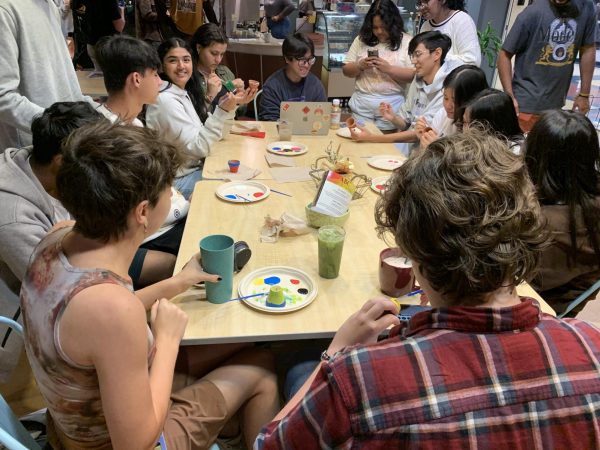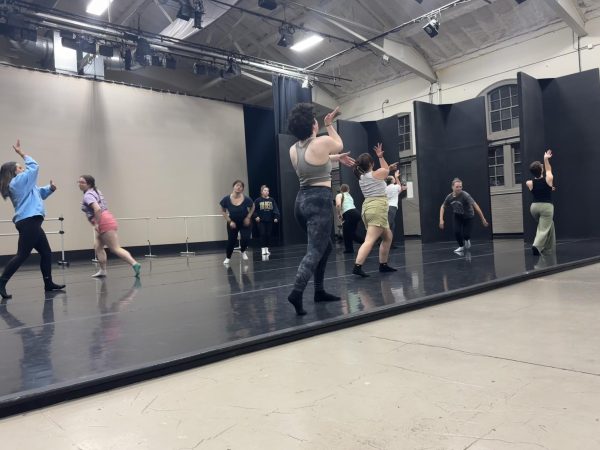Hillel celebrates Passover with campus community
Annual holiday commemorates the liberation of ancient Israelites
To celebrate Passover, Allegheny College Hillel hosted a campus-wide Passover Seder in Schultz Banquet Hall on Wednesday, April 12.
Passover is one of the most important holidays in the Jewish religion, according to Director of Jewish Life Adrienne Krone. Passover began on Monday, April 10, and lasts eight days. It commemorates the liberation of the ancient Israelites from slavery in Egypt and is based on the biblical book of Exodus.
“It celebrates the exodus where we were wandering the desert and came to the land of Israel,” Hannah Firestone, ’19, said.
Firestone is the vice president of Hillel, Allegheny College’s student-led Jewish organization. She said Passover has always been important to her.
“To me it’s really cool because my ancestors have been doing this for thousands of years,” Firestone said. “We do it at my grandparents’ house, and there’s always a huge meal. This year we had 25 people, three tables and two rooms, and it was really long. We just went around and did different readings. It’s really fun and personal.”
Krone said that a number of students on campus often choose to go home to be with their families, especially during the first days of Passover.
“It’s one of our most important holidays, and a lot of our students do choose to go home for the holiday,” Krone said.
Most Jewish people celebrate Passover with Seders on the first and second night, according to Krone. Wednesday’s Seder was the third Seder the college has hosted as part of Passover.
To mark the first day of Passover, Hillel held a smaller, more intimate Seder in the East Alcove of Schultz for Hillel members on Monday. On Tuesday, Hillel partnered with the Inclusion, Diversity, Equity, Access and Social Justice Center as well as the United Faith Fellowship Church of God, and Showing Up for Racial Justice Crawford County to host a community justice Seder at the United Faith Fellowship Church of God.
Seder means order, which is represented in the structure and proceedings of a typical Seder.
“You go through a prescribed set of readings and prayers and blessings and eat foods that are meant to help the participants remember what it was like to be enslaved,” Krone said. “For instance, you eat horseradish to recall the bitterness of enslavement and oppression, and you dip parsley in salt water to remember the tears. You tell the story of the exodus, which is the liberation of ancient Israelites from bondage in Egypt.”
As well as the Seders, Krone said there are many food practices that last the full eight days of the holiday. These dietary restrictions vary from family to family, according to Krone, but it is a common practice for Jewish people who observe Passover to only eat unleavened bread called matzah. Krone explained that this is based on part of the Exodus story where Moses goes to Pharaoh 10 times and asks for his people to be let go. Each time Pharaoh says no, but on the tenth time Pharaoh concedes.
“They don’t have time for the bread to rise because they just need to get out of Egypt. So to commemorate that you eat bread that hasn’t risen basically for 8 days,” Krone said. “Some people also abstain from eating beans and rice and corn because depending on how those are cooked, some people think that they also rise.”
Firestone said the college is good at accommodating these dietary restrictions for Jewish students on campus and making them feel comfortable.
“They have matzah which you can use at the sandwich stations, you can also use it to make your own pizza,” Firestone said. “They did matzah ball soup in Brooks today, but they put noodles and corn in … so I couldn’t eat that, but they did have [it] which was a really nice effort because some people don’t care about corn or the tiny little noodles. I’m just very strict personally. They’re really accommodating. I just ask and they provide.”
Hillel President Sydney Lewis, ’19, said she loves the Seder part of Passover, but that for her, Passover is all about family. Lewis is from Arizona and was unable to return home for the holiday.
“Hillel is pretty much my [family]. I do miss my family, but I don’t mind being with this type of family,” Lewis said. “I have to find ways to make it as traditional as possible.”
Hillel’s goal is to give Jewish students a place to practice in a comfortable fashion, according to Firestone.
“Judaism is all about community and family,” Firestone said. “There’s no doctrine. There’s not, ‘You have to believe this, this and this.’ Aside from a couple basic things, it’s pretty much whatever you make of it. We have a lot of cultural Jews that aren’t really religious.”
Hillel is open for anyone to join and its events are all open to the public, according to Firestone.
“It’s a club, but it’s a family,” Firestone said. “It’s people who come from similar backgrounds, and I don’t have to explain why for Passover I’m not eating bread. It’s just a really good place to go.”
The club hosts weekly Shabbat services and events, for the greater campus community. Lewis said Hillel’s biggest events include Hanukah, Passover and Israel Fest.
“Hillel’s really cool because it doesn’t matter if you’re conservative or reform or you’re more of a cultural Jew, there’s something for everyone,” Lewis said.





